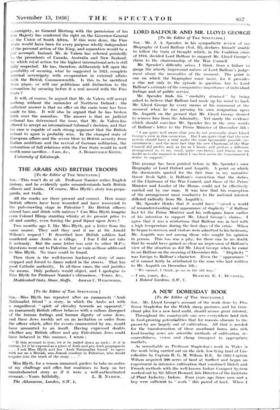LORD BALFOUR AND MR. LLOYD GEORGE
[To the Editor of THE SPECTATOR.]
SIR,—Mr. J. A. Spender, in his sympathetic review of my Biography of Lord Balfour (Vol. II), declares himself unable to follow the train of thought which, in the Coalition crisis of 1916, decided Lord Balfour to support Mr: Lloyd George's claim to the chairmanship of the War Council.
Mr. Spender's difficulty arises, I think, from a failure to gauge the utterly impersonal nature of Lord Balfour's judge- ment about the necessities of the moment. The point is • one on which the biographer must insist, for it provides a clue not only to the episode in question, but to Lord 13alfour's estimate of the comparative importance of individual , feelings and of public service.* Mr. Spender finds his " credulity strained by being-
asked to believe that Balfour had made up his mind to back Mr. Lloyd George by every means at his command at the moment when he was pressing his own resignation upon Mr. Asquith on the ground that Mr. Lloyd George desired to remove him from the Admiralty. Yet surely the evidence
which should convince Mr. Spender lies in the very words of Balfour's letter to the Prime Minister of December 5th :
" I am quite well aware that you do not personally share Lloyd George's view in this connexion. But I am quite clear that the new system should have a trial under the most favourable possible eir- etunstanees ; and the mere fact that the new Chairman of the War Council did prefer, and, 89 far as I know, still prefers a different arrangement is, to my mind, quite conclusive, and leaves me no doubt as to the manner in which I can best assist the Government I desire to support."
This passage has been printed before in Mr. Spender's own Biography of Lord Oxford and Asquith. A point on which the documents quoted for the first time in my narrative throw fresh light, is Balfour's conviction that the duties. of the Chairman of the War Council, and those of the Prime Minister and Leader of the House, could not be effectively carried out by one man. It was here that his conception of the arrangement most conducive to the national interest differed radically from Mr. Asquith's.
Mr. Spender thinks that it would have " saved a world of misunderstanding and appearance of duplicity if Balfour had let the Prime Minister and his colleagues know earlier of his intention to support Mr. Lloyd George's claims. I agree that it was a misfortune that Balfour was in bed with a high temperature during the first days of the crisis. When he began to recover, and visitors were admitted to his bedroom; Mr. Asquith was not among those who sought his opinion in person. This too was a pity, for there can be no doubt that he would have gained as clear an impression of Balfour'S view of the situation as did Mr. Lloyd George when he came to see Balfour on the morning of December 6th. " Duplicity " was foreign to Balfour's character. Even the " appearance .* of it cannot fairly be attributed to the man who had written to Mr. Asquith on December 5th :
" We cannot, I think, go on in the old way.'
1 Roland Gardens, S.W. 7.














































 Previous page
Previous page